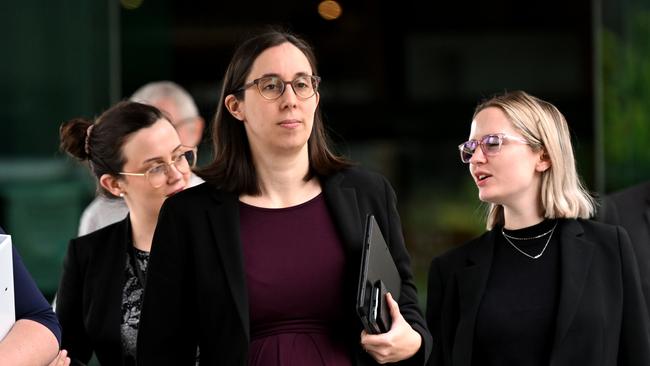DNA lab inquiry: Rape victims underwent invasive procedures in vain
Hundreds of rape victims had invasive procedures that should have yielded DNA of alleged attackers, but the samples were never tested by Queensland’s forensics lab.

Hundreds of rape victims underwent invasive procedures that should have yielded the DNA of their alleged attackers, but the samples were never tested because of flaws in sperm detection at Queensland’s forensics lab that spanned eight years.
Commissioner Walter Sofronoff, who is overseeing a public inquiry into the lab, estimated about 400 DNA samples from sexual assault cases “went through to the keeper” between 2008 and 2016.
“So there was a problem of some kind in the preparation of the slide or the extraction or something, leading up to that slide being examined,” he said during Monday’s hearing.
“There was a potential for a range of samples to be missed.”
The revelations are the latest in a litany of lab failures that have emerged over the three weeks of the inquiry, which was sparked by The Australian’s investigative podcast series Shandee’s Story, about the death of young Queensland woman Shandee Blackburn.
A threshold introduced in the lab in February 2018 resulted in thousands of DNA samples going untested.
The inquiry has also been told of a toxic culture at the lab in which staff who warned about potential problems with the new threshold were ostracised.
Police have raised concerns about the lab reversing its findings on DNA samples and last week the inquiry was told that rusty chisels and new testing equipment might have triggered a disastrous 50 per cent failure rate in detecting DNA in bones.
The problems with rape victim analysis were identified by scientists, including Jacqui Wilson, who began escalating grave concerns to superiors in late 2015 after detecting male DNA in crime-scene samples initially reported as being negative for sperm.
Anger at Queensland DNA lab’s U-turn on evidence
Despite scientists’ fears that crucial evidence was being missed, it took lab managers another eight months before they changed procedures to ensure all sperm samples were fully tested.
Senior scientist Amanda Reeves raised concerns with managers twice in 2016 about the delay in investigating the issue after Ms Wilson flagged a discrepancy in sperm tests with her.
“We really need this sort of ASAP and I can't understand why there is not more urgency around this. It’s freaking me out,” Ms Reeves wrote in a July 2016 email to managers.
“Given the high risk, I’m asking if it can be made a priority.”
Ms Reeves followed up with a second email a week later. “Over six months have passed and I have been ignored and worse, shouted at and humiliated in a room full of people,” she wrote. “There is still no outcome and we are still exposed in terms of risk.”
Mr Sofronoff KC asked his counsel assisting, Susan Hedge, if there was any evidence to explain “why there was no sense of urgency in ensuring that no samples in sexual assault cases were being missed”.
Ms Hedge replied: “No”.
She added: “Of course, in the criminal justice system sometimes one result is the one that matters.”
Despite testing flaws on sperm samples in potential rape cases being uncovered in 2015, lab managers have still not audited exactly how many samples were missed despite scientists’ requests, the inquiry was told on Monday.
As a result, the number of rape investigations potentially linked to failures to detect sperm is unknown.
Mr Sofronoff is considering whether a workplace culture at the lab contributed to extensive delays in investigating testing problems and stopped scientists speaking out about other issues.
“The story so far is that something is going wrong with microscopy when looking for semen and everybody knows that as a consequence some samples might have been missed,” Mr Sofronoff said. “It took eight months, longer actually, from the time the issue was first raised … for anything to be done about it.”
In January 2017, managers sent the sperm microscopy protocol to New Zealand lab ESR for an independent review, but failed to mention Ms Reeves’ concerns that evidence was being missed.
“In order to put the issue to bed, among other things, ESR is briefed to have a look at sperm microscopy and the sperm identification and testing process and they're not told the single greatest issue that affects that process that arose in 2016,” Mr Sofronoff said.
“Instead, they're given the standard documents to have a look at.”
Scientist Allan McNevin, who was in charge of evidence recovery at the lab when sperm detection problems were uncovered, said he did not remember thinking it was an urgent issue at the time. “I recall at the time I didn’t want the laboratory going into crisis mode over a process that had been in place for years,” Mr McNevin said.
The inquiry is also investigating an unusually high threshold for testing DNA that resulted in thousands of crime-scene samples going ignored for almost five years, failures to find DNA in blood samples and a disastrous 50 per cent failure rate in detecting DNA in bones.
Mr McNevin was responsible for introducing a new procedure for cleaning the lab’s bone crushers, chisels and saws in July 2019, which the inquiry had heard may have contaminated samples.
Bone expert Angelina Keller has told the inquiry Mr McNevin had “no experience in bones” and did not consult with experienced analysts at the lab before deciding equipment would be run through a dishwasher with bleach and ethanol.
In May this year, Ms Keller noticed chisels used to chip away bones for DNA testing were “rusty due to the new cleaning regime”.
Mr McNevin is expected to face questioning about his rationale for new cleaning procedures at Tuesday’s hearing.



